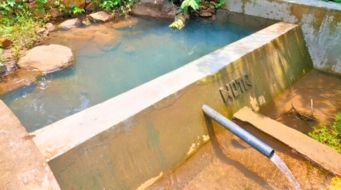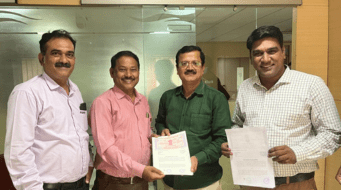By Team W-CReS, Vikas Prakash Joshi and Geetanjali Prasad
The word ‘Research’ can be broadly defined as the “creation of new knowledge and/or the use of existing knowledge in a new and creative way so as to generate new concepts, methodologies and understandings”. [1] Another definition of research is the ‘systematic investigation into and study of materials and sources in order to establish facts and reach new conclusions’. [2] Under this broad umbrella of ‘research’ come various other concepts, like research into use (RIU), applied research and experimental development. In this blog, we are going to take a closer look at the concept of RIU and explore how WOTR as an institution translates this concept into on-ground interventions.
What is RIU?
RIU is a planned process in which key findings or conclusions from a particular body of research or study are then used to influence or shape a particular policy or policies. [3] According to the Department for International Development (DFID) it is a way of knowledge dissemination that is used to translate research to the communities by a simplified representation of life conditions. One of the key aspects of the RIU approach is that it emphasises the need for research findings to be communicated to target audiences in a simple and effective way. The aim of RIU is to examine ways of functioning in a particular sector or of an organisation, and identify if there can be changes in any particular organisation’s policy or how a sector as a whole functions. The findings from RIU can be used then to influence policies. However, the methods adopted must also be realistic as using research findings to influence policies can involve a wide variety of stakeholders, with varied and even opposing views and priorities.
In that context, it is pertinent to note that the Watershed Organisation Trust, (WOTR), has considered RIU to be a core part of its approach to rural development and climate change adaptation, for the last many years. While applied research has been a focus area, WOTR’s strength lies in its on-field experience and in a systemic, participatory approach. The organisation has evolved to tackle more complex development challenges through applied-interdisciplinary research. The desire to become a centre of excellence in RIU and applied research eventually led to the establishment of the WOTR Centre for Resilience Studies (W-CReS) in December 2016.
The goal of W-CReS is to bridge some of the gaps between science, policy and practice and promote multi-stakeholder collaboration at all levels, implementation, capacity building and behavioural change processes. The objective is to promote adaptive responses and mitigate the impacts of climate change on ecosystems, water resources, agriculture, food and nutrition, health, livelihoods, gender, governance and local institutions. These themes are the core focus of its inquiry and study. The key idea that underpins W-CReS’s research is that it is ‘demand driven’.
By ‘demand driven’ we mean that the research is in response to the needs of the people. Examples of WOTR applying such an approach to translate its research are the ‘Bucket Game’ and Community Driven Vulnerability Evaluation Visual Integrator (Co-DriVE-VI). We touch upon both of these two in the paragraphs below.
WOTR’s Bucket Game
Water is perhaps the most critical natural resource in rainfed farming systems and for human life as a whole; therefore, this is the issue central to all of WOTR’s activities. In order to translate research into impactful ground practices, the first step is to explain the problems of unsustainable water use or water pollution to the people in a simple way. Games are a very good way of achieving this objective.

A photo of the ‘Bucket Game’ being played at WOTR’s Darewadi Learning Centre in Maharashtra. Senior Researcher Dr. Eshwer Kale can be seen at the centre, in the kurta. Photo: WOTR
The ‘Bucket Game’ is played by both villagers and those into research. It assigns the role of three generations of water users in several different families. Each individual generation competes against the players of the corresponding generations for maximising their benefits (which in the case of the game is filling up bottles of water from a common resource like a bucket). The first- and second-generation players respond quite aggressively to the benefit maximising incentives, only to find that their respective last generations literally scrape water to fill their bottles. The visuals of people scraping water out of a bucket often trigger a reflection of what the future generations might finally have to do in reality.
Such games lead to at least an initial acceptance of the problem. Only time will tell whether the visuals and the realisations remain with the players and lead to changes in behaviour.
Co-DriVE – Visual Integrator (Co-DriVE-VI)
While the bucket games is one such example of RIU, another notable example is the Community Driven Vulnerability Evaluation Visual Integrator (CoDriVE-VI). It is often seen that rural communities are left out of development planning as they are not able to articulate a long-term vision for their needs. However, for sustainable planning and development, local communities need to be a part of the development process.
It is to provide to a solution to this challenge and encourage local participation, that WOTR developed the tool (CoDriVE-VI). This is a participatory 3-D modelling tool. This tool helps enhance participants’ understanding and their knowledge regarding the available water resources by demystifying the science of hydrology. The villagers can visualize and relate their village topography with the subsurface and understand the groundwater scenario. It also aids them to understand the groundwater potential zones and its recharge mechanism through different rocks that are present below their village surface.

Participants creating a participatory 3D model of their village, with the help of the Co-DriVE-VI tool. Photo: WOTR
Connecting practice to policy
WOTR’s efforts to connect practice to policy are not, however, limited to the above two examples. As a part of its Adaptation at Scale in Semi-arid Regions (ASSAR) project, WOTR also conducted various workshops like: Transformative Scenario Planning (TSP), Stakeholder engagement workshops, Stories of change, while also motivating communities to take on water saving actions under the Water Stewardship Initiative.
Research findings on vulnerability assessments, including ground water vulnerability, helped participants understand the different aspects that contribute to their current water scarcity situation, in comprehensive manner. It motivated the development of village water management plans.
International consultations on “Adapting Agriculture to a Global Temperature Rise of 1.5°C” and “Consultation on Climate Adaptation and Services for Health Security” were organised by WOTR in 2018 and 2017 respectively, engaging national and international stakeholders. Papers like the Heat stress paper and the Heat stress film were discussed among different stakeholders.
The outcome of the consultation on climate adaptation and services for health security is a Communique that has been shared with policy makers at the regional and national levels. Various Impact pathways and Posters on Heat stress prevention were prepared in the local language and disseminated across villages in some of the heat stress hot spots in Maharashtra. In order to reach a wider audience, the heat stress pamphlet prepared by WOTR, has been also been translated into languages like Hindi and Telugu.
Also, WOTR’s research on stakeholder engagement and TSP on groundwater management and governance has contributed evidence to the implementation of the framework of the Maharashtra Groundwater (Development and Management) Act 2009.
Challenges in the process
Within RIU, engaging government officials throughout the stakeholder engagement/TSP process and sharing of delayed research findings in engagement activities within project period are challenging tasks. The biggest challenge for the facilitation team during TSP process was to translate and interpret specific concepts and terms of the TSP methodology into the local language so that it can be easily understood.
With the help of ASSAR’s videos on Heat Stress and TSP, workshops and consultations and games, WOTR was able to encourage people to get out of the comfort of ‘silos’ and look at the impacts on the linkages to other sectors while developing adaptation plans.
Conclusion
The larger aim of RIU, emphasises WOTR’s Senior Researcher Dr. Eshwer Kale, is for WOTR to avoid the trap of being totally focused on pure research or be completely oriented towards implementation. “WOTR occupies a unique space as an agency that is actively involved both in implementation as well as in applied research. RIU as a concept keeps us rooted in the principle that the research we do should be of benefit to the people we work for and not be research only for publishing papers or presenting at conferences,” he concludes.
References
- https://bit.ly/2RLCl5G
- https://en.oxforddictionaries.com/definition/research
- https://www.gov.uk/dfid-research-outputs/research-into-use-a-short-guide





